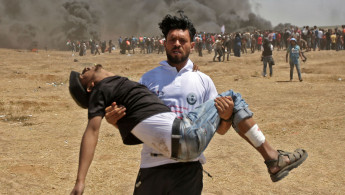UN votes to send international war crimes probe to Gaza
With 29 votes in favour, two opposed and 14 abstentions, the UN's top human rights body voted through a resolution calling on the council to "urgently dispatch an independent, international commission of inquiry... to investigate all alleged violations and abuses... in the context of the military assaults on large scale civilian protests that began on 30 March 2018.”
Israel has come under international pressure after the massacre of Palestinians protesting against the transfer of the US embassy to Jerusalem on Monday.
It was the deadliest day in the besieged territory since 2014 war.
Over 117 Palestinians have been killed by Israeli forces since protest dubbed "Great Return March" began on 30 March calling for their right of return.
The opening of the US embassy in the contested city of Jerusalem comes at a time when Palestinians are commemorating the Nakba, or "the Catastrophe", when hundreds of thousands of were forced from their homes during the formation of Israel.
The latest announcement came after international calls to investigate what has been described as a massacre by Israeli forces.
On Friday, the UN human rights chief slammed Israel's deadly reaction to protests along the Gaza border as "wholly disproportionate”, backing calls for an international investigation.
Zeid Ra'ad Al Hussein warned that "killing resulting from the unlawful use of force by an occupying power may also constitute wilful killings, a grave breach of the Fourth Geneva Convention,” while addressing a special session of the UN Human Rights Council on the violence which has claimed more than 100 Gazan lives in six weeks.
Violations of the Geneva Conventions adopted in 1949 following World War II are commonly called "war crimes", although Zeid did not explicitly use that word.
He pointed out though that while 60 Palestinians were killed and thousands injured in a single day of protests on Monday, "on the Israeli side, one soldier was reportedly wounded, slightly, by a stone."
"The stark contrast in casualties on both sides is ... suggestive of a wholly disproportionate response," he told the council.
Many of the Palestinians injured and killed "were completely unarmed, (and) were shot in the back, in the chest, in the head and limbs with live ammunition," he said, saying there was "little evidence of any (Israeli) attempt to minimise casualties."
"Although some of the demonstrators threw Molotov cocktails, used slingshots to throw stones, flew burning kites into Israel and attempted to use wire-cutters against the two fences between Gaza and Israel, these actions alone do not appear to constitute the imminent threat to life or deadly injury which could justify the use of lethal force."
On Thursday, the Arab League also called for an international probe into this week's Israeli "crimes" against Palestinians protesters.
"We call for a credible international investigation into the crimes committed by the occupation," said Ahmed Abul Gheit at the opening session of an extraordinary meeting of Arab foreign ministers in Cairo, regarding Monday's Gaza massacre.
Tens of thousands of Palestinians gathered close to the Gaza border to protest against the US President Donald Trump's decision to move the embassy from Tel Aviv to Jerusalem, and recognise the contested city as Israel's capital.
"We are facing a state of blatant aggression against international law and legitimacy which was embodied by the US embassy's transfer in the occupying state to Jerusalem," said Abul Gheit.





 Follow the Middle East's top stories in English at The New Arab on Google News
Follow the Middle East's top stories in English at The New Arab on Google News


